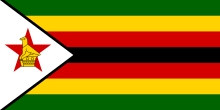 | |
| Total population | |
|---|---|
| c. 16–22 million worldwide[1] | |
| Regions with significant populations | |
| 1,000,000– 3,000,000[3] | |
| 128,000[4] | |
| 65,000[5] | |
| 50,000 | |
| 30,000–50,000 (estimate)[6] | |
| 31,225[7] | |
| 10,000[8] | |
| 8,372[9] | |
| 5,600[citation needed] | |
| 5,348[10] | |
| 3,715[11] | |
| 1,312[12] | |
| 1,160 | |
| 1,103[13] | |
| 859[14] | |
| Languages | |
| Zimbabwean English • Shona • Ndebele | |
| Religion | |
| Methodism • Roman Catholicism • Anglicanism • Pentecostalism • Judaism. | |
The Zimbabwean diaspora refers to the diaspora of immigrants from the nation of Zimbabwe and their descendants who now reside in other countries. The number of Zimbabweans living outside Zimbabwe varies significantly from 4 to 7 million people, though it is generally accepted at over 5 million people, some 30 per cent of all Zimbabweans.[15] Varying degrees of assimilation and a high degree of interethnic marriages in the Zimbabwean diaspora communities makes determining exact figures difficult. The diaspora population is extremely diverse and consists of Shona people, Ndebele, white Zimbabweans, mixed-race people, Asians, Jewish people and other minority groups. The diaspora traces their origin to several waves of emigration, starting with the exodus that followed the 1965, unilateral declaration of independence in Rhodesia, but significantly since the sociopolitical crisis that began in 2000.[16]
Countries with the biggest diaspora populations include South Africa, the United Kingdom, Australia, Canada, New Zealand and the United States.[17] There is mobility within the diaspora. For example, some Zimbabweans have moved to the UK before deciding to settle in Australia.[18]
- ^ "The Engagement of the Zimbabwean Medical Diaspora" (PDF). Southern African Migration Programme.
- ^ "Census 2012 national report" (PDF). Archived from the original (PDF) on 21 September 2020.
- ^ "Archived copy" (PDF). Archived from the original (PDF) on 3 March 2016. Retrieved 26 February 2021.
{{cite web}}: CS1 maint: archived copy as title (link) - ^ "Table 1.3: Overseas-born population in the United Kingdom, excluding some residents in communal establishments, by sex, by country of birth, January 2019 to December 2019". Office for National Statistics. 21 May 2020. Retrieved 28 July 2020. Figure given is the central estimate. See the source for 95% confidence intervals.
- ^ "ABS Ancestry". Abs.gov.au. 2012.
- ^ "Explore Census Data". data.census.gov.
- ^ "Census Profile, 2016 Census". 8 February 2017.
- ^ "Rising levels of resentment towards Zimbabweans". 9 June 2008.
- ^ "Population par sexe, âge et nationalité en 2018". insee.fr. Retrieved 15 October 2021.
- ^ Irish census data
- ^ "Foreigners in Germany by origin 2021". Statista.
- ^ "Zimbabwe-Emigrantes totales".
- ^ "Archived copy" (PDF). Archived from the original (PDF) on 5 March 2016. Retrieved 2 September 2015.
{{cite web}}: CS1 maint: archived copy as title (link) - ^ Shen, Simon (15 December 2017). "Hong Kong's ties with Zimbabwe: The past and the present". EJ Insight.
- ^ Dinner with Mugabe: The untold story of a freedom fighter who became a tyrant. Penguin Random House South Africa. 24 September 2012. ISBN 9780143027416.
- ^ Chikanda, Abel; Crush, Jonathan (2018). "Global Zimbabweans: Diaspora Engagement and Disengagement". Journal of International Migration and Integration. 19 (4): 1037–1057. doi:10.1007/s12134-018-0582-0. S2CID 159012899.
- ^ "Zimbabwe: Diaspora remittances in decline". The Africa Report.com. The Africa Report. 4 February 2014.
- ^ "Zimbabwe: First Family Has Low Opinion of the People". AllAfrica.